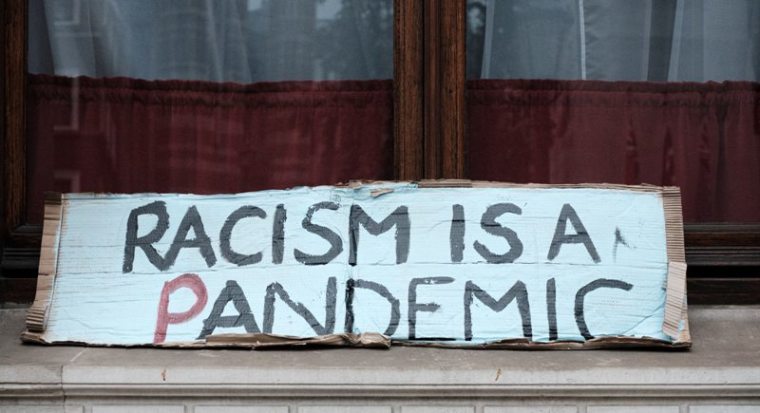
In May, the Teaching Council of Aotearoa New Zealand launched the Unteach Racism programme (www.unteachracism.nz) to ‘identify, confront and dismantle bias and prejudice so education in New Zealand is free from racism’.
The programme includes a video of filmmaker Taika Waititi talking to his eight-year-old self about the racism he would encounter at school. He tells himself: ‘I know everyone thinks you stole Tommy’s shoes … Well, I reckon they’re gonna be pretty bummed out when he finds the shoes tomorrow by the pool.
‘And I know your English teacher said he wasn’t expecting much of your English because, “you’re not English”, but I like your stories. And who knows, one day your storytelling might mean you get to work with some of the world’s most overpaid actors.
‘And forget about being accused of being a glue-sniffer, or stealing lunches, or that you’re brown because you don’t take baths. Europeans didn’t take baths until like 1962 … You’ve been made to believe that you’re not trustworthy, you’re trouble, that you won’t add up to much. But you’ll prove them all wrong. You’ve got this, little me. You’ve got this! If only you could see how much you’re worth.’
My friend Wendy recalls the racism she encountered while at school. ‘I was a Māori student – one of very few in my class. I wrote a speech for a speech competition, and the teacher wanted to know who had written it for me. He said, “There’s no way she wrote that.”
‘He didn’t even talk directly to me, only about me. I was the only Māori student who submitted a speech, and I was the only one accused of cheating. I was sent to the principal’s office and was told to rewrite my essay. I never pursued any sort of writing after that. I’ve never forgotten that feeling, and how affronting that was to me as a person.’
Living in a bubble
Dean Pallant, author of To Be Like Jesus: Christian Ethics for a 21st Century Army, is head of Communications for The Salvation Army in the United Kingdom. Before that, he was Director of The Salvation Army’s International Social Justice Commission in New York.
Pallant was born in Rhodesia – a British colony. The ‘white-only’ government declared independence just before his first birthday. Pallant had hardly any social engagement with non-whites. His schools were for whites only until he was 16. The only ‘black’ African person to come to his Salvation Army church was a man they called ‘the hall boy’, an adult male janitor.
‘Looking back,’ says Pallant, ‘I can now see I lived in a bubble. A privileged whites-only bubble. I was aware that there were lots of black African people around. I was rarely aware of any tension … we lived separate lives. Racial divisions were taken for granted … Non-whites were not like “us”.’
Pallant points out that there is no biological evidence to justify categorising people according to race. Discrimination based on race is a human creation, and racist thoughts can affect anyone.
He retells a story from Nelson Mandela’s autobiography, The Long Walk to Freedom. Mandela was getting on a plane in Ethiopia to fly to Europe in the 1960s, before he went to jail for 27 years for resisting apartheid. The pilot started speaking and Mandela realised the pilot was a ‘black’ African. Immediately, Mandela says he felt scared. He thought, ‘How can a black man fly a plane?’ At that moment, Mandela realised his mind had been conditioned to be racist by his culture.
What is it like to experience racism? I don’t know, because I live in that whites-only privileged bubble Pallant writes about in his book.
My friend Wendy describes the experience this way: ‘Why aren’t I smarter? Why am I different? You believe the lie immediately. At home, my father told me I could do anything. But when I got to school, I was told, “You can’t do that job, you can’t go to university.” I was told, “You speak very well for a Māori.” That’s been my experience all my life – and it still continues in subtle ways today. That’s the experience of racism: you doubt yourself as a human being!’
Fighting the evil of racism
When I think about racism, I think of retired Salvation Army officer Campbell Roberts, who protested apartheid during the 1981 Springbok Tour to New Zealand, hiding a pair of bolt cutters in his Salvation Army uniform to cut through police barriers.
Roberts recalls, ‘The galvanising point for me was a week before the tour when I was in a prayer meeting that I had agreed to be part of for every game. As I was praying, God said to me, “Why are you here talking when people are facing danger and harm in street protests? That is where you should be!”
‘So, the next Saturday, I joined the protest and was asked to hide the bolt cutters in my uniform. I must say it wasn’t an act of bravery on my part – I was terrified of getting arrested – but I had a sense that to follow God I had to fight in every way I could against the evil of racism.’
The Salvation Army’s International Positional Statement on Racism says while ‘many Salvationists have acted firmly and courageously against racism, The Salvation Army acknowledges with regret that Salvationists have sometimes shared in the sins of racism and conformed to economic, organisational and social pressures that perpetuate racism.’
Roberts agrees with these words as he reflects on his current service as a community member on the New Zealand Parole Board.
‘I spend a great deal of time presently in the presence of Māori prisoners who have had such tragic lives,’ he says, ‘and I have to face the fact that if we as Christians and the Church had been more active in speaking out against racism in New Zealand over the years then a large number of young Māori men and their children wouldn’t be facing the difficulties and struggles they are. They are not experiencing the abundant life Christ came to give because of the injustices that were brought on Māori through the colonisation process.’
‘Someone like me’
The Bible is unambiguous on this. 1 John chapter 4, verses 20 - 21 (CEV) says, ‘But if we say we love God and don’t love each other, we are liars. We cannot see God. So how can we love God, if we don’t love the people we can see? The commandment that God has given us is: Love God and love each other!’
A few years ago, Dean Pallant’s wife Eirwen, a medical doctor as well as a Salvation Army officer, wrote a reflection entitled ‘Someone Like Me’, in which she observes: ‘When we see another person as “other”, someone different to ourselves, it can lead us to treat them differently, often without considering what we are doing. We may ignore them, exclude them from our social groups, feel threatened by their difference and fear them, try and change them, blame them as the cause of our misfortunes, or judge them as unworthy. Prejudice and discrimination are at the root of inequality and injustice. Unfortunately, the church has acquired a reputation for acting in all these ways, sometimes a reputation that has been well earned.’
She offers the following prescription: ‘My prayer for myself and my church is that we may recognise the “someone like me” in every person. Let us not view anyone as “other” or different or alien. It is easier to love your neighbour as yourself when you see them as “someone like me”. When we do, the image of God will shine more brightly in us, revealing the true God, who is gracious, loving, merciful and welcoming to everyone.’
In 2017, Taika Waititi was part of the New Zealand’s Human Rights Commission’s ‘Give Nothing to Racism’ campaign (www.givenothing.co.nz).
The ambition of this campaign was simple yet powerful: ‘Racism starts small. Sometimes it lives in everyday actions and comments that we laugh off, nod in agreement to, excuse, and therefore accept. But we don’t have to. We can stop casual racism from growing into something more extreme. We can give it no encouragement. No respect. No place. No power. We can give it nothing.’
As Christians, some of us must do more than ‘give racism nothing’. Some of us need to repent of our complicity in perpetuating the sins of racism. We must ask God to change our hearts, to change our attitudes, to change our speech, and to change our actions. We must unlearn racism.

Christina Tyson has been a Salvation Army officer (minister) for almost 30 years.For 16 years she was involved in Salvation Army communications, and now works with her husband as pastors of a Salvation Army church and community centre in Newtown, Wellington.